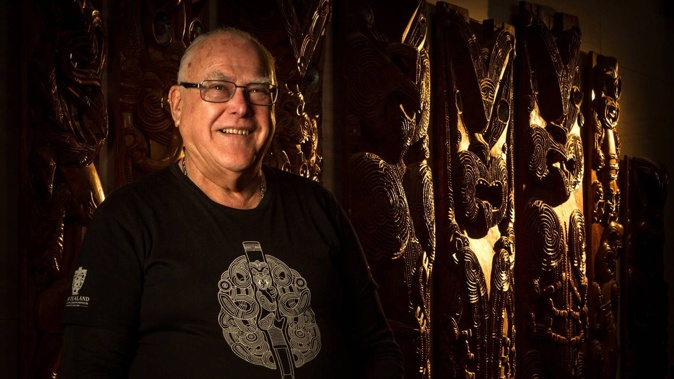
Long-standing Rotorua master carver Clive Fugill is retiring from the New Zealand Māori Arts and Crafts Institute.
The 74-year-old tohunga whakairo is hanging up his tools to spend more time with whānau, a media release issued today on behalf of the institute and Fugill says.
In the 56 years Fugill has dedicated to mastering the traditional Māori art form, he has also played a key role in documenting tribal history, carving wharenui and passing down his knowledge to generations of traditional Māori carvers, the statement says.
When an 18-year-old Fugill walked through the doors of the institute as part of the first carving school intake, he had no idea he would end up devoting his life to the art of whakairo (carving).
Fugill said he had been lucky enough to have made a career out of doing something he loves.
/cloudfront-ap-southeast-2.images.arcpublishing.com/nzme/ZARWCE4GIJIQSJXZJ6UAMMJ2QQ.jpg)
In the beginning — Clive Fugill is third from left in this picture from 1967.
He said he had always been drawn to the beauty and storytelling in Māori carving.
“I never described myself as the sharpest chisel of the lot but after I was accepted into the carving school I thought ‘right, I’m here for the next three years, I better make the most of it and learn everything I can’.
“Then when we graduated and I received the first honours award, I nearly fell off my chair.”
Fugill was appointed a tohunga whakairo in 1983 and has carried the title with pride ever since.
“I was a bit reluctant to accept the appointment at first because I didn’t feel up to it, but somebody had to do it and I had to back myself and step up to the plate.”
Fugill has become a trusted adviser, contributed to countless wharenui and created bespoke taonga for royalty, presidents and celebrities.
“I am especially proud of the work we’ve done carving wharenui across the motu, including my own wharenui at Te Puna-Tutereinga.
“It’s a special thing working on your own wharenui and with your own people, hearing and documenting the stories and knowing they will live on; it was a real highlight of my career.”
Institute general manager Eraia Kiel said in the release Fugill had been a stalwart of the organisation, helping shape the carving school into what it is today.
“Clive is always one to share his time and knowledge generously. He genuinely cares about preserving the art of whakairo and the tikanga that surround it.
“For nearly six decades, Clive has honed his skills and passed on everything he knows and for that, we are incredibly grateful.
“He is a rangatira, a true leader and his students’ successes are testament to his commitment.”
Kiel said Fugill’s daily presence at the institute would be sorely missed.
Fugill said there was much more to whakairo than just carving wood.
“It’s about capturing the whole essence of a people, the reo; everything comes into play.
“That’s what we work so hard to preserve and my hopes for the institute are that each generation of students carries that on and protects our art forms so that they never die.
“I started off carving in the shed and now I’m going back to carving in the shed, but that’s okay, because you know what they say: You can take the boy out of the institute, but you can’t take the institute out of the boy.”
Take your Radio, Podcasts and Music with you









